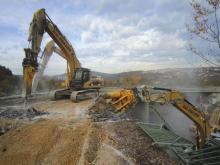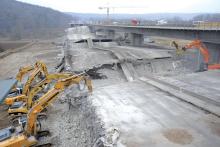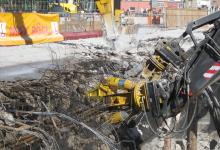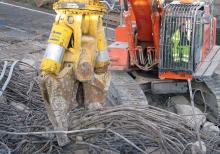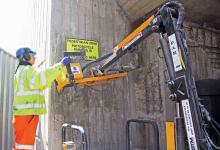A high speed bridge demolition project has been carried out successfully in Germany. Speed was of the essence as the bridge spanned an important road link and had to be removed in a tight time frame, minimising disruption to traffic.
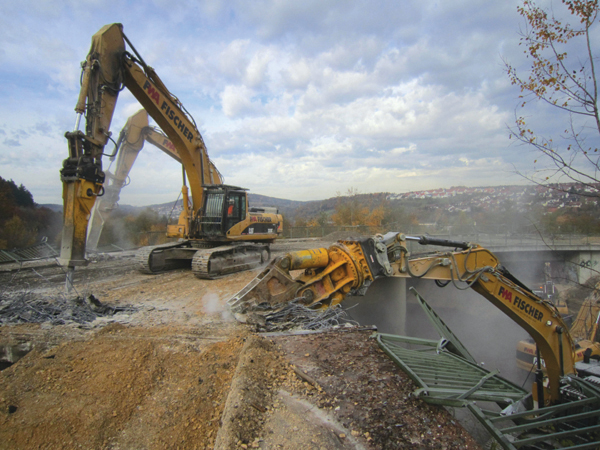
Atlas Copco hydraulic equipment performed reliably during a 30 hour project to remove an old road bridge in southern Germany
A high speed bridge demolition project has been carried out successfully in Germany. Speed was of the essence as the bridge spanned an important road link and had to be removed in a tight time frame, minimising disruption to traffic.
The job formed part of a project for a new layout of the junction of the roads B297 and B29 close to Lorch in southern Germany. FWA Fischer Weilheim Abbruch was brought in by the Stuttgart Regional Council to demolish the old bridge carrying the B297 over the B29. The two-bay bridge structure was made of reinforced concrete and weighed 3,000 tonnes. During demolition work, damage caused to the closed section of Federal road had to be avoided at all cost.
The demolition job turned out to be difficult because the bridge not only featured a longitudinal and transverse slope, but also had a curve at a 280m radius to the horizontal. Slightly offset and some 15m below the bridge, a passage for local residents' vehicles had to be always accessible for rescue vehicles during the entire demolition period.
The only way to carry out the job was for the demolition to be undertaken during a set period when the roads could be closed, to minimise disruption and maximise safety.
Work started with the full closure of the roads, the removal of the crash barriers and the protection of the Federal road B29 using an impact bed made of material for subsequent recycling. This was followed by the demolition of the bridge carried out by the fleet of178 Caterpillar machines consisting of a wheeled excavator and five crawler excavators equipped with hydraulic breakers and CombiCutters.
For its attachments FWA2777 Fischer Weilheim used 161 Atlas Copco tools; a total of five model HB3000, HB4200 and HB7000 heavy hydraulic breakers which were supported by four model CC3300U, CC3300S and CC6000U CombiCutters.
As the two HB3000 hammers were breaking down the 300mm thick deck slab from above, the two CC3300U and the CC6000U CombiCutters started to reduce the bridge caps. Then the bottom chords with a cross sectional area of 4m2 of concrete were demolished by the two HB4200 hydraulic breakers and the HB 7000. Once the longitudinal reinforcements were accessible, they were cut by the CC3300S into lengths suitable for removal.
Once the entire bridge bay had been demolished, the CC6000U CombiCutter used its force and its 1.4m wide jaw to demolish the bridge abutments. The use of this large CombiCutter allowed the demolishers from Weilheim to tear down without major effort the one metre wide and heavily reinforced wing walls of the abutment. Afterwards the 7tonne hydraulic breaker was used to reduce the abutment to the ground.
According to the contractor the availability of the hydraulic tools more than met requirements. All five hydraulic attachments worked non-stop for 30 hours without problems.
Once the demolition work was complete the concrete was recycled on site for use in other road construction projects.
The job formed part of a project for a new layout of the junction of the roads B297 and B29 close to Lorch in southern Germany. FWA Fischer Weilheim Abbruch was brought in by the Stuttgart Regional Council to demolish the old bridge carrying the B297 over the B29. The two-bay bridge structure was made of reinforced concrete and weighed 3,000 tonnes. During demolition work, damage caused to the closed section of Federal road had to be avoided at all cost.
The demolition job turned out to be difficult because the bridge not only featured a longitudinal and transverse slope, but also had a curve at a 280m radius to the horizontal. Slightly offset and some 15m below the bridge, a passage for local residents' vehicles had to be always accessible for rescue vehicles during the entire demolition period.
The only way to carry out the job was for the demolition to be undertaken during a set period when the roads could be closed, to minimise disruption and maximise safety.
Work started with the full closure of the roads, the removal of the crash barriers and the protection of the Federal road B29 using an impact bed made of material for subsequent recycling. This was followed by the demolition of the bridge carried out by the fleet of
For its attachments FWA
As the two HB3000 hammers were breaking down the 300mm thick deck slab from above, the two CC3300U and the CC6000U CombiCutters started to reduce the bridge caps. Then the bottom chords with a cross sectional area of 4m2 of concrete were demolished by the two HB4200 hydraulic breakers and the HB 7000. Once the longitudinal reinforcements were accessible, they were cut by the CC3300S into lengths suitable for removal.
Once the entire bridge bay had been demolished, the CC6000U CombiCutter used its force and its 1.4m wide jaw to demolish the bridge abutments. The use of this large CombiCutter allowed the demolishers from Weilheim to tear down without major effort the one metre wide and heavily reinforced wing walls of the abutment. Afterwards the 7tonne hydraulic breaker was used to reduce the abutment to the ground.
According to the contractor the availability of the hydraulic tools more than met requirements. All five hydraulic attachments worked non-stop for 30 hours without problems.
Once the demolition work was complete the concrete was recycled on site for use in other road construction projects.

